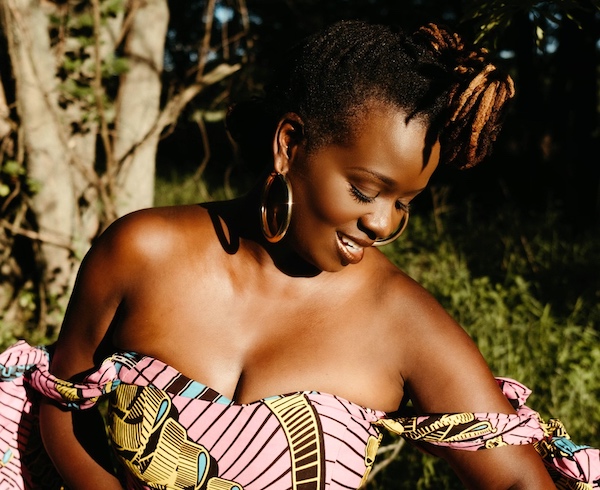Jan 13, 2026 2:09 PM
More Trump-Kennedy Center Cancellations
The fallout from the renaming of the John F. Kennedy Center for the Performing Arts to include President Donald…

A portion of the proceeds from Somi’s latest album, Holy Room: Live At Alte Oper With Frankfurt Radio Big Band, go to benefit the Black Art Futures Fund.
(Photo: Anna Longworth)Her world is inarguably vast. The daughter of a Rwandan father and Ugandan mother, she lived part of her childhood in Zambia and in Illinois. She traveled on an anthropology research fellowship to Kenya and Tanzania after earning her bachelor’s degree, going on to get a master’s at the prestigious NYU Tisch School of the Arts, and then moved to Nigeria for 18 months of independent field work. Next, she returned to New York and took up residence in Harlem, a place undergoing rapid social changes. Her point of view—informed by research and expressed through art—takes into account all of these influences.
“I’m just naturally a hyphenated person,” she observed. “So, I’ve decided to lean into the ‘in between.’”
From her first album for Sony/Okeh in 2017, The Lagos Music Salon, Somi pulled some of her program’s most engaging tunes—“Last Song,” an anthem for the unabashedly enamored; “Two-Dollar Day,” an unflinching commentary on economic privation; and “Lady Revisited,” her irrepressible ode to Nigerian Afrobeat innovator, Fela Kuti. These tunes, unintentionally “auto-ethnographic,” Somi said, owe much to her ability to communicate visceral realities through storytelling.
“For me, [that album] was about giving everyone the sense of my journey to Lagos, to present a more nuanced side of a major African city,” she explained. “I loved Lagos.”
Somi’s attachment to Nigeria led indirectly to her second album for Sony/Okeh, Petite Afrique, which won the NAACP Image Award for Outstanding Jazz Album in 2018. Named after a Francophone subsection of Harlem, the album takes on the disruption that economic instability has caused the African immigrant community there.
“[That community] reminded me of the sacrifice that my own parents made as immigrants to this country,” Somi explained. “I was really frustrated with the fact that Harlem was rapidly gentrifying. I kept thinking about the quiet erasure that was happening.”
These tunes, an artistic stand against cultural erasures, make up most of the new album. Among them are Somi’s hard-hitting, horn-blasting challenge to societal notions of racial identity, “Black Enough,” and her mournful reflection on the loss of home, “Like Dakar.”
Petite Afrique also gave the new album its title cut. But “Holy Room,” a majestic musical meditation, has taken on added meaning since the onset of the pandemic. In naming the new album, Somi “was thinking about the sacredness of these cultural spaces that are now sitting silent,” she said. “It’s such a heartbreaking sound.”
One of those silent cultural spaces is The Repertory Theatre of St. Louis, where Somi was booked in March to premiere Dreaming Zenzile, her stage musical on South African singer Miriam Makeba, a pioneer of African popular music. “Everybody should know who she is,” Somi said. “She was the first African artist to have huge, global commercial success.”
As Somi ponders what might constitute success during a global lockdown, she remains committed to providing a platform that features African voices. So, as an emerging philanthropist, she said, she’ll be donating a percentage of the Holy Room proceeds to the Black Art Futures Fund: “I wanted to help a national, interdisciplinary organization that fosters narratives from the African diaspora. This was one that I found. The only one.” DB

Belá Fleck during an interview with Fredrika Whitfield on CNN.
Jan 13, 2026 2:09 PM
The fallout from the renaming of the John F. Kennedy Center for the Performing Arts to include President Donald…

Peplowski first came to prominence in legacy swing bands, including the final iteration of the Benny Goodman Orchestra, before beginning a solo career in the late 1980s.
Feb 3, 2026 12:10 AM
Ken Peplowski, a clarinetist and tenor saxophonist who straddled the worlds of traditional and modern jazz, died Feb. 2…

The success of Oregon’s first album, 1971’s Music Of Another Present Era, allowed Towner to establish a solo career.
Jan 19, 2026 5:02 PM
Ralph Towner, a guitarist and composer who blended multiple genres, including jazz — and throughout them all remained…

Rico’s Anti-Microbial Instrument Swab
Jan 19, 2026 2:48 PM
With this year’s NAMM Show right around the corner, we can look forward to plenty of new and innovative instruments…

Richie Beirach was particularly renowned for his approach to chromatic harmony, which he used to improvise reharmonizations of originals and standards.
Jan 27, 2026 11:19 AM
Richie Beirach, a pianist and composer who channeled a knowledge of modern classical music into his jazz practice,…